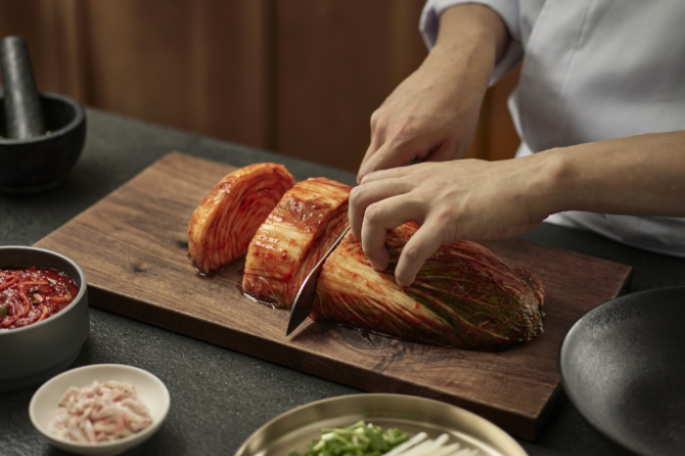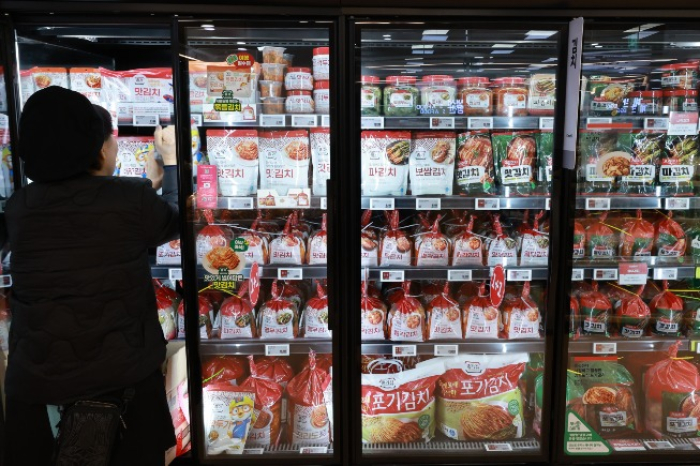Food & Beverage
Lotte Hotels & Resorts ups ante in kimchi business
The largest South Korean hotel chain operator earned about $543,000 in the month after resuming kimchi sales
By Nov 21, 2023 (Gmt+09:00)
2
Min read
Most Read
LG Chem to sell water filter business to Glenwood PE for $692 million


Kyobo Life poised to buy Japan’s SBI Group-owned savings bank


KT&G eyes overseas M&A after rejecting activist fund's offer


StockX in merger talks with Naver’s online reseller Kream


Mirae Asset to be named Korea Post’s core real estate fund operator



South Korea’s largest hotel group Lotte Hotels & Resorts is pinning high hopes on kimchi as a new revenue source amid intensifying competition in the local hospitality industry in the endemic era.
According to sources in the Korean hotel industry on Tuesday, Lotte Hotels in September reformed its private brand team to launch the e-commerce team in charge of active marketing of its brand label products outside of the group.
The team’s mainstay product is kimchi, a Korean staple food made with fermented, seasoned vegetables, and often very spicy.
In August, the Korean hotel and resort chain operator announced its return to the kimchi market about four years after its exit in 2019. It resumed its kimchi sales with napa cabbage kimchi and then rolled out other types of kimchi made with spring onions and mustard leaves in October.
The launch of the e-commerce team reaffirms Lotte Hotels’ strong will to rebuild its kimchi brand in the 1.4 trillion won ($1.1 billion) kimchi market vied for by food and retail companies.
About 80% of the Korean packaged kimchi market is shared by the market's top two players, Daesang Corp. and CJ CheilJedang Corp., which are the country’s major food companies. Many small players compete for the remaining 20%.
NEW REVENUE SOURCE
Lotte Hotels’ move comes at a time when competition in the Korean accommodation market is intensifying amid a return of foreign visitors to the country following the end of the COVID-19 pandemic.

Considering that Lotte Hotels earned 700 million won in kimchi sales just one month after resuming sales of the side dish, and that amount is equivalent to revenue earned from selling about 2,800 standard hotel rooms, the kimchi business has proved to be profitable despite kimchi’s low unit price.
Nor does the kimchi business require a hefty investment to start because the company can use the employees and distribution network of its existing food & beverage stores to make and sell kimchi.
Lotte Hotels will manage the whole kimchi production and sale process, from new product planning to sales, with the new team.
Its kimchi will be sold in large volumes from 4 to 9 kilograms per package to lure steady buyers. It plans to deliver kimchi once a week as it makes and delivers kimchi the same day it receives the order.
It also plans to sell its kimchi to its sibling department stores and overseas hotels later.
According to Nielson Korea, the Korean store-bought kimchi market more than doubled to 302.3 billion won in 2020 from 2015.
According to Korea Customs Service, Korea’s kimchi exports in the January-October period this year increased 7.2% to 37,110 tons from the same period last year.
Kimchi was also exported to 93 countries, including Japan and the US, over the same period, breaking the 90-country threshold for the first time.
Write to Mi-Kyoung Lee at capital@hankyung.com
Sookyung Seo edited this article.
More to Read
-
 Korean foodLotte Hotels & Resorts to launch premium kimchi product
Korean foodLotte Hotels & Resorts to launch premium kimchi productAug 10, 2023 (Gmt+09:00)
1 Min read -
 Korean foodInstant noodles, rice, kimchi buoy Korean food exports
Korean foodInstant noodles, rice, kimchi buoy Korean food exportsSep 25, 2023 (Gmt+09:00)
2 Min read -
 Korean foodUS set to emerge as top global buyer of Korean kimchi: Daesang
Korean foodUS set to emerge as top global buyer of Korean kimchi: DaesangMar 28, 2023 (Gmt+09:00)
2 Min read -
 Korean foodKimchi exports to US reach record high of $27 million so far this year
Korean foodKimchi exports to US reach record high of $27 million so far this yearDec 05, 2022 (Gmt+09:00)
1 Min read
Comment 0
LOG IN


